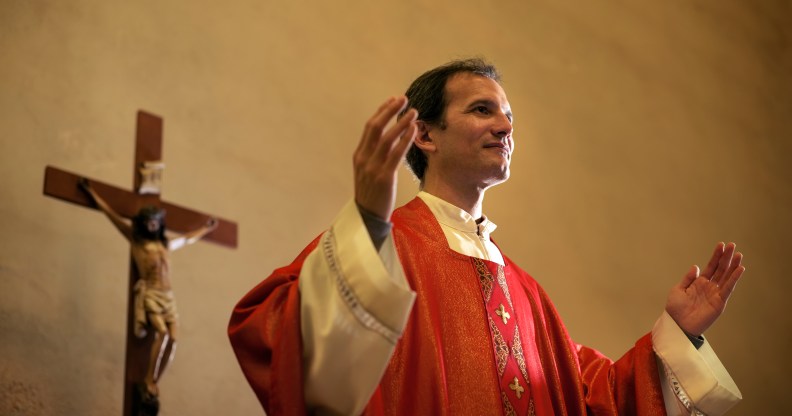German bishops declare that homosexuality is completely and utterly ‘normal’

Catholic priest on altar praying with open arms during mass service in church. (Stock photo via Elements Envato)
In a groundbreaking move, German bishops have revised teachings on sexual morality and said homosexuality is “normal”.
As the Catholic Church prepares for its contended review, the Commission for Marriage and Family of the German Bishops’ Conference came to the consensus that being gay is a “normal form of sexual predisposition.”
Moreover, church organisers committed to “newly assessing” topics such as sacraments of ordination and marriage, with another revision being that adultery will not longer “always be qualified as grave sin”, the Catholic News Agency reported.
For centuries, Church leaders have been rattled by the thought of people being sexualities other than heterosexual. But as public attitudes and governments overwhelmingly sway in favour of letting the LGBT+ community exist, the church has steadily caught up to speed.
German bishops call for homophobia to be ‘rejected’ in the church.
The German Catholic Church’s statement comes ahead of a two-year ‘Synodal Process’ by the Germans which will see a national reform consultation. Although, Vatican leaders have warned against this.
In a press release detailing the conclusions of the conference, it detailed how a panel of bishops, sexologists, moral theologians and canon lawyers deliberated how to discuss “the sexuality of man […] scientifically-theologically, and how to assess it ecclesiastically.”
The experts, consisting of bishops from four diocese, agreed in the Berlin conference that “human sexuality encompasses a dimension of lust, of procreation, and of relationships”, the release stated.
“There was also agreement that the sexual preference of man expresses itself in puberty and assumes a hetero- or homosexual orientation. Both belong to the normal forms of sexual predisposition, which cannot or should be be changed with the help of a specific socialisation.”
The panel also said that “any form of discrimination of those persons with a homosexual orientation has to be rejected.”
However, the panel did not reach a consensus across all battle lines. There was no consensus on “whether the magisterial ban on practiced homosexuality is still up to date.”
Furthermore, the experts also disagreed on whether or not both married and unmarried people should be allowed to use artificial contraceptives.

